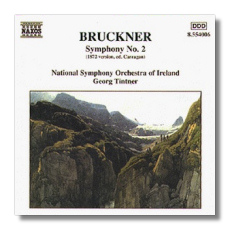
The Internet's Premier Classical Music Source
Related Links
- Bruckner Reviews
- Latest Reviews
- More Reviews
-
By Composer
-
Collections
DVD & Blu-ray
Books
Concert Reviews
Articles/Interviews
Software
Audio
Search Amazon
Recommended Links
Site News
 CD Review
CD Review
Anton Bruckner

Symphony #2
- Symphony #2 in C minor (1872 version ed. Carragan)
National Symphony Orchestra of Ireland/Georg Tintner
Naxos 8.554006 71:22
I have recollections of a recording of this by Giulini on EMI. I am not sure what the orchestra was, the LP disappeared long ago, but I remember really liking the recording. Someday I will have to see if I can locate the cassette I made of it. Since then I have been trying to find a recording of the piece that recalls for me the same level of involvement that the Giulini had. I have tried both Solti and Chailly on CD and previously Herbert Von Karajan on LP. I gave the Solti away in preference for the Chailly, though I felt something was missing from the Chailly recording, something I could not put my finger on.
The notion of a "youthful" Bruckner Symphony almost sounds like an oxymoron. This second symphony (okay, his fourth if you want to quibble) was written when the composer was damn near 50. Still, the second has a pastoral-like quality that is fascinating. This is, however, not the pastoral aspect you get from Beethoven's Symphony. Rather it is the kind you would feel if you could sit in my living room and look out over century old trees stretching over green hills as far as your eye can see. You hear many of the elements that appear in Bruckner's later symphonies, such as the grand gesture from the brass, but this is still not juvenile Bruckner. (I wonder if he ever was a teenager;-) The insert notes in both the Naxos and London recordings are equally insightful, though I prefer Maestro Tintner's. (For what it is worth, the first five paragraphs of Maestro Tintner's notes are the same in all three of the so-far issued discs in the Naxos series)
Anyway, this is no contest, Tintner's Bruckner 2nd has it all over Chailly's. Add in the price differential and you win twice. The sound difference is a tie, the London being more sleek and lush, but the Naxos is just fine thank you. In fact the sound on the London disc contributes to the general sense that Chailly is not really in tune with this piece (pun intended, I fear). Chailly seems to skate on the surface of the meaning of the symphony and employ legato to the point that it is close to Von Karajan. (Never have figured out why his Bruckner is so highly rated, maybe someday I will)
Even simple music has a pulse. The other day I was watching Dylan, one of my five-year old twins (and she's a she!!) As she was watching some kid's show her body began to move with the pulse. This is one of the points made in Jourdain's book, Music, the Brain, and Ecstasy. The sound path travels into the ears and directly to a region of the brain that is connected with physical response. Great interpretations of music capture that elemental pulse. As I listen to the Tintner recording of this symphony, I find my body responding to the pulse. In fact, I sat down to "just listen" to it after having finished what I thought was the final draft of this essay. Then my hands picked up the pen and wrote in response to the sensations from listening to this recording. No such response accrues when I listen to the Chailly recording, but I have a recollection of just such a reaction when listening to the Giulini (would that EMI deign to issue that on CD).
Tintner's recording is the first of the original 1972 version. The main differences between the Chailly (Haas) and this one are the reversal of the order of the second and third movement and restoring repeats (which contribute to the additional 4 minutes in Tintner's recording). The differences in interpretations, however, are even more significant. I have already itemized several points, so let me cover just a few more. First, Chailly's adagio sounds almost Mahlerian, particularly in the andante, Tintner's is pure Bruckner. Second, Tintner's Bruckner is more earthy, Chailly more Olympian. When you listen to Tintner you can smell the earth as you crumble it between your fingers. The balance is more natural in Tintner, the strings are not swamped by the brass, as in some recordings, nor, as in Chailly's, are they too dominant. Tintner seems to have a feel for the perfect sound for the woodwinds (as was also noted in the review of the Bruckner 6th). In fact, they go a long way in giving Tintner's recording a pastoral quality I have not heard before.
Copyright © 1998, Robert Stumpf II


















